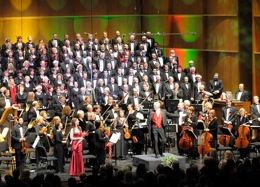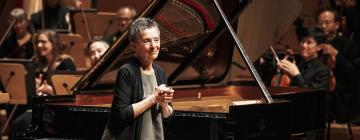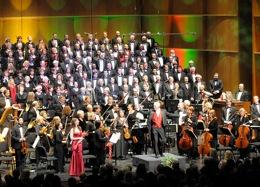
Kendrick spoke about the musical, emotional, and cultural innovation of Brahms’ signature work: “It’s certainly not a Requiem in the regular sense, what audiences of the late 19th century were used to hearing. It was put together in stages, and some of the earlier parts were not well-received — were even booed — when first performed. The Germans thought them too austere. Brahms was scarred by that.”
The very sense of a service for the dead seemed a challenge. “Where you would expect a Dies Irae, [Brahms] thumbs his nose at death: ‘O Death, where is thy sting?’ The whole sense of the piece is to create a universal text.” Kendrick continued, remarking, “During the 80 minutes of the Requiem, Brahms never mentions Jesus or Christ. He addresses the bereaved, the living, rather than the dead. He’s not trying to scare the daylights out of you. He read the Bible as Handel did; he said he always could find his Bible at night on its stand. Brahms chose his favorite scriptures about hope, consolation. He once said it was A German Requiem simply because it was in the language of Luther’s Bible. That’s why we’re calling the program ‘A Mass for Humanity, A Work of Consolation and Hope,’ which is how he described it. Something the world needs today.”
Kendrick stressed that “Brahms was a very private, not a public, person. During the Requiem, the mood over and over again turns to private moments.” Brahms was reacting emotionally to the recent death of his mother, as well as revealing his lingering sadness over Robert Schumann’s death almost a decade earlier. When he learned, later, that Schumann had planned his own “German Requiem,” Brahms was very moved.
Kendrick emphasized that “Brahms knew — and really revered — early music. The big fugues in the piece are much like Handel’s. When he does turn to Romantic music, it’s quite glorious. There’s a real balance of texts. ...”
Kendrick’s Sacramento Choral Society and Orchestra stands as a unique organization among the 12,000 or so community choruses around the country, in that it maintains a collective bargaining agreement with its own professional orchestra. “It’s our commitment to the musicians,” Kendrick said. “We’ve been doing it for 14 years. Before we were the Sacramento Choral Society, originally the group was the Sacramento Symphony Chorus, which twice went bankrupt. The second time, I was chorus master and assistant conductor. It was sad. The players were fleeing to San Francisco, L.A., for work.
“A city like Sacramento should have a professional orchestra. So we hired the orchestra — and haven’t gone into debt in 14 years. We thought we must be nuts to do this, but somehow it’s been working. It’s grassroots, an all-volunteer chorus, though we call them ‘professional volunteers’: 180 voices, and 40 of them work on chorus operations, like the library, wardrobe, auditions. ... We draw from seven different counties. Some drive two hours to rehearsal, performances — then the ensemble disappears into the fog, like Camelot, only to reappear again!”
Kendrick himself is a native of Calgary, in western Canada, who has also lived in Toronto and taught in Saskatchewan, though all his schooling was in the U.S. He attended the American Conservatory of Music in Chicago, the New England Conservatory in Boston, and Stanford University, and he received a doctorate from the Eastman School of Music in New York, where he served on the faculty.
After teaching at Louisiana State University, various universities in Canada, and the University of the Pacific, Kendrick moved to Sacramento, where he directs choral activities for three choirs at Sacramento State University. He also instigated SSU’s graduate degree program in choral conducting. He’s celebrating his silver anniversary at Sac State. In addition, he’s cofounder and artistic director of the Sacramento Children’s Chorus, and is organist as well as conductor of two choirs at Sacred Heart Church in the city: Vox Nova Men’s Chorus and Schola Cantorum.
His half-dozen choirs travel to perform around North America and internationally. “We travel to Europe pretty regularly. I took 220 choristers to China — six busloads, like a caravan!” In Rome, one of his choirs sang at a private audience with Pope Benedict, and sang in St. Peter’s. “In Salzburg last spring, we stood on Brahms’ grave together.” Kendrick described his taste for conducting large orchestral works, “big gorgeous warhorse pieces,” saying, “we might be dinosaurs, but we’re given to performing works of lasting value. We’re the antidote to Madonna!”

